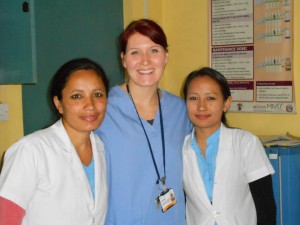A Good Hope midwife who appeared on the BBC documentary, ‘The Toughest Place to be a Midwife’ in Liberia is now using her experience to pass on skills in Nepal, which suffers from high maternal and mortality rates and poor midwifery coverage.
Suzanne Saunders, from Sutton Coldfield, has continued her interest in global maternity care and midwifery issues since taking part in the 2011 television series, and has more recently been working alongside the nurse-midwives at the Paroparkar Maternity and Women’s Hospital in Kathmandu.
The aim of the trip was to promote standardised birth practices, encourage evidence based practices and to provide teaching/training sessions to the nurse-midwives. During this time, Suzanne also worked alongside the Midwifery Society of Nepal (MIDSON) to train 104 local nurse-midwives about the role of the midwife in improving maternal health and supporting labour and birth.
The visit was funded through a Royal College of Midwives partnership with the Health Partnership scheme, the Department for International Development (DFID) and Tropical Health Education Trust (THET).Suzanne’s visit was part of the RCM’s long-term Global Midwifery Twinning project to strengthen links globally.
Suzanne said: “I volunteered to go to Nepal because I wanted to share my knowledge with others and have it reciprocated, because I’m interested in midwifery practices around the world, and because I believe that all women should have access to maternity care during their pregnancy.
From going to Nepal, I could see the difficulties that the country has in providing maternity care, and suggested ways in which the UK can help the Midwifery Society of Nepal promote midwifery and have its voice heard. I felt great satisfaction in having being part of some essential training and have some fantastic feedback which I can take back to Good Hope and the RCM for further volunteers to work on.”







